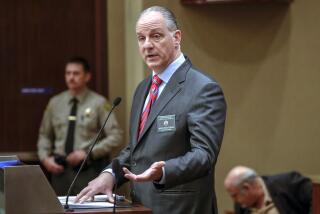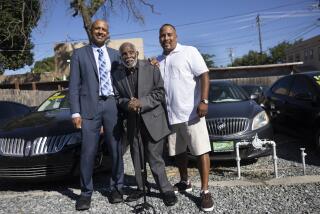Insurance Executive May Get New Trial : Ex-Judge Slams Prosecutor in ’81 Murder
Misconduct by a San Diego County prosecutor and perjury by his key witness resulted in the wrongful conviction of Sorrento Valley insurance executive Herman Martin for arranging the murder of a La Jolla attorney, according to a retired judge investigating the case for the state Supreme Court.
Gerald Brown, who retired last year as presiding judge of the 4th District Court of Appeal, concluded after six weeks of hearings that threats by Deputy Dist. Atty. James Pippin and his investigator, Larry Wilson, intimidated and discouraged key defense witnesses from testifying on Martin’s behalf in his 1982 trial on charges of masterminding the murder of attorney Richard Crake.
In a report filed Friday with the California Supreme Court, Brown also said the prosecution’s main witness, gunman Andrew Powell, fabricated testimony claiming that Martin, his employer, gave him a gun and directed him to work over Crake to collect a $100,000 debt.
Brown’s findings are not binding on the Supreme Court, and Dist. Atty. Edwin Miller pledged Tuesday to challenge the retired judge’s findings. But if the high court justices uphold Brown’s conclusions, Martin, 65, could win a new trial and release from prison, where he is serving a sentence of 16 years to life.
The 50-page report blasts Pippin and Wilson, who still work for the district attorney, for their conduct during Martin’s trial. It found that they engaged in “heavy-handed” and “blatant” improprieties that constituted a “misuse of prosecutorial power.”
Pippin said Tuesday that some of Brown’s findings were “ridiculous” and that the retired judge had seen fit to believe convicted felons rather than upstanding employees of the district attorney’s office.
Allegations of prosecutorial misconduct recently have dogged other major criminal cases in San Diego County.
In the Sagon Penn murder trial, the defense has accused the district attorney’s office of harassing a juror and withholding a critical document. Also, the lawyer for a man charged with assaulting San Diego Police Officer Stephen Williamson alleged this week that a prosecutor intimidated police supervisors, to discourage them from providing the defense with information about Williamson, who has shot three civilians in five years.
Miller and his office have dismissed all the charges of misconduct, describing them in sometimes sarcastic terms as unfounded and irrelevant to the guilt or innocence of the accused.
In an interview Tuesday, Miller said such charges seem to have become “a fad” for San Diego defense lawyers. He termed Brown’s analysis of the Martin case a “rather naive, gullible approach” and said he was confident that Martin would be convicted again if the Supreme Court orders a retrial.
Crake, 54, was bludgeoned to death May 12, 1981, in the foyer of his La Jolla condominium. The oft-sued attorney had been locked in a court dispute with Martin--a protected government witness who testified against East Coast racketeers in the mid-1970s--over a $100,000 business loan.
Powell, an ex-Marine who had worked less than two months for Martin’s insurance company, pleaded guilty to killing Crake by repeatedly beating him on the head with a gun. Powell, now serving a 15-year-to-life sentence for second-degree murder, testified that Martin gave him the gun and told him to beat up Crake and collect the $100,000 debt. When Crake resisted, Powell killed him.
However, Brown’s report concludes that Powell acted alone in the murder, falsely accusing Martin to avenge the insurance executive’s failure to bail him out of jail after the crime and to secure a lighter sentence for himself.
After listening to Powell’s testimony for three days, Brown said, “it was apparent that Powell would say almost anything, whatever was in his mind at the moment, if it helped himself.” Brown quotes a Marine general acquainted with Powell who said the convicted killer was “no good” and “a liar.”
Misconduct by the prosecution denied Martin critical evidence needed to establish his innocence and prove Powell lied about the killing, Brown ruled. Three witnesses who were prepared to testify for the defense instead refused to testify under threats from the prosecution that they would be charged themselves if they appeared on Martin’s behalf, Brown said.
The intimidation took two forms, the judge’s report says. First, Wilson and another prosecution investigator arrested the defense’s lead-off witness, Steven Aguilar, in a courthouse hallway at the end of his testimony. Aguilar had testified that he--not Martin--supplied Powell with the gun used in Crake’s killing, directly contradicting Powell’s testimony.
The arrest of Aguilar as an accessory to murder--made in the presence of other defense witnesses and a newspaper reporter--was widely publicized, Brown noted. The potential defense witnesses who ultimately refused to testify said they were aware of the arrest and concerned that the same might happen to them, according to Brown’s report. The charge against Aguilar eventually was dropped.
Their concern was heightened, Brown said, by a second form of intimidation: Threats from Pippin and Wilson that they would be prosecuted if they gave incriminating testimony when called to the stand by the defense.
One of the potential witnesses, Charles Riley, would have testified that he gave Aguilar the gun that Aguilar said he provided to Powell, the report says.
Another, Eugene Wallace, was Powell’s cellmate at the County Jail downtown. According to Brown’s report, Wallace would have testified that he helped Powell fabricate the story implicating Martin in Crake’s murder.
The third potential witness, John Gross, would have testified that Powell told him in a jailhouse conversation that he went to Crake’s residence on his own, and that Martin had nothing to do with the killing, the report says.
In contrast, Brown said, prosecution witnesses--including the woman who drove Powell to and from Crake’s home the night of the murder--faced no threat of prosecution for their potentially incriminating testimony.
Brown concludes that “overzealousness” on the part of the prosecution denied Martin a chance to present his defense.
“Mr. Pippin’s treatment of his own witnesses demonstrates how the misuse of prosecutorial power distorted the fact-finding process in Martin’s case,” Brown wrote. “Three defense witnesses, who were prepared to testify for (Martin), asserted their privileges against self-incrimination at the trial. Several prosecution witnesses gave potentially incriminating testimony, but were neither admonished by Mr. Pippin nor threatened with criminal charges.
“This is understandable,” Brown said. “They were prosecution witnesses.”
In an interview Tuesday, Pippin rejected Brown’s finding that he had intimidated potential defense witnesses by telling their attorneys they could face prosecution for their testimony.
“I told their attorneys I wouldn’t grant them immunity,” Pippin said. “If they got on the witness stand and admitted a crime, they’d be prosecuted for it, and if they committed perjury and we could prove it, they’d be prosecuted for that. . . .
“As a result of that, some people who were either going to admit to a crime or were going to lie didn’t testify, and (Brown) finds that to be inappropriate, or misconduct, on my behalf.
“Apparently, according to his opinion, it’s inappropriate for the district attorney to prosecute crooks and liars and it’s appropriate to let them go.”
Pippin noted that Martin was held liable for Crake’s death in a civil trial last year where all three of the witnesses who refused to testify in the criminal case took the stand.
“The jury heard all their testimony, disregarded what they had to say, didn’t believe them and found Martin responsible,” Pippin said.
Pippin said Brown, a former civil lawyer, had little experience in weighing the credibility of witnesses’ testimony.
He said Brown had been “handpicked” to investigate the case by Chief Justice Rose Elizabeth Bird, whose rulings in criminal cases have come under harsh attack by prosecutors as she campaigns for reconfirmation.
Miller noted that the jury in Martin’s criminal trial also believed Powell’s testimony. He said prosecutors were under no obligation to grant defense witnesses immunity and said Brown’s report “second-guessed” issues that even the U.S. Supreme Court had refused to review when it rejected an appeal of the case.
San Diego attorney Charles Sevilla, who argued Martin’s case in the hearing before Brown, said the complaints by the district attorney’s office were “sour grapes.”
Quoting from a transcript of the proceedings, he said prosecutors had told Brown the hearing was “impeccably” fair and that, based on the six weeks of testimony, they would not be surprised by whatever conclusions he reached.
More to Read
Sign up for Essential California
The most important California stories and recommendations in your inbox every morning.
You may occasionally receive promotional content from the Los Angeles Times.










